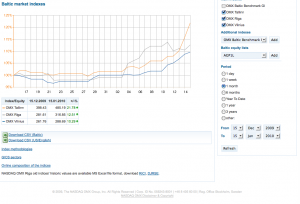
Tallinn and Vilnius' index is continuing to rise, while Riga's rally has already dissipated. Source: OMX Baltic
VILNIUS — The OMX Nasdaq stock exchanges of the three Baltic states have rallied intensely so far this month, with Vilnius and Tallinn still shooting up while Riga’s has leveled off.
The thinly-traded markets typically fluctuate in parallel, given the interconnectedness of the three economies. After a steady decline in each market since rallying in late summer, each had steadily declined until the beginning of January.
Estonia’s has been the most substantial gain, with the value of its market index increasing 20 percent in two weeks. Economists point to the positive news about the country’s eurozone entry prospects in 2011 as helping fuel the drive.
“This euro adaption hope has received some attention,” Kristjan Lepik, publisher of the Estonian financial news website tarkinvestor.ee told Baltic Reports.
SEB private banking strategist Peeter Koppel points to low liquidity on the Tallinn market and rallies in Central and Eastern Europe as other causes, but warned it may not last.
“When it comes to the duration of the rally, then the local market is speculative and the attitudes may vary from one edge to another,” Koppel told Baltic Reports.
SEB’s broker in Vilnius, Vydas Jacikevičius, said the rally was fueled by “emotional buying” that started with local investors and then professional investor funds were forced to follow the rally. Swedbank said this was not suprising.
“Local investors have been more aggressive, which is not surprising considering the large amount of people who were waiting and searching for a way to enter the market,” Andres Suimetsa, head of Swedbank stock exchange division told Baltic Reports.
May not reflect overall economy
Vilnius’ market is mimicking Tallinn’s to a large extent, but Riga’s January rally is already over and the index is beginning to stagnate. Analysts point to increasing unemployment and a shaky political situation for discouraging investment in Latvia.
Jacikevičius said that given the small size of the markets, the activity on the Baltic OMX exchanges often does not correlate directly to the overall economies of the three countries.
“I would say that we will not see such rapid recovery as we will see in the stock market. This rally is rather short-lived unless it is backed by corporate results,” Jacikevičius said. “Most of those companies are still operating in the red, but investors are expecting them to recover later this year.”
— Baltic Reports reporter Kai Joost contributed to this article.












